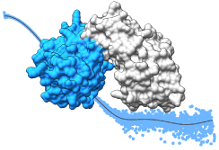FAQ and Help
Tutorial
There is a pyDockSAXS server tutorial which you can follow here.
Moreover, a chapter with a complete description of the protocol has been published in Structural Bioinformatics.
Input data
pyDockSAXS uses three different files as input data:
Email address
The email address is optional and only used to notify the user once the job has been finished.
Reference
To cite pyDockSAXS server, please reference “pyDockSAXS: protein-protein complex structure by SAXS and computational docking, B Jiménez-García, C Pons, DI. Svergun, P Bernadó and J Fernández-Recio. Nucleic Acids Research 2015; doi: 10.1093/nar/gkv368”
PDB structure files
We encourage to follow the PDB file format. Note that incomplete backbone or side-chain atoms may incur in inaccurate results and/or software failure.
SAXS data
Experimental SAXS input data is a file following this format:
- First line is always ignored and treated as a title.
- The following lines should contain three float values representing momentum transfer, non-zero intensity and standard deviation separated by blanks or commas. If standard deviations are not specified, they will be estimated automatically by CRYSOL (2% of the intensity values).
Title line
0.5000E-02 0.2064E+08 0.4227E+06
0.7500E-02 0.2053E+08 0.4200E+06
0.1000E-01 0.2115E+08 0.4161E+06
0.1250E-01 0.2090E+08 0.4112E+06
0.1500E-01 0.2077E+08 0.4054E+06
0.1750E-01 0.1971E+08 0.3986E+06
0.2000E-01 0.1945E+08 0.3909E+06
0.2250E-01 0.1898E+08 0.3823E+06
0.2500E-01 0.1832E+08 0.3730E+06
0.2750E-01 0.1897E+08 0.3631E+06
0.3000E-01 0.1737E+08 0.3525E+06
0.3250E-01 0.1676E+08 0.3414E+06
0.3500E-01 0.1632E+08 0.3298E+06
0.3750E-01 0.1629E+08 0.3179E+06
0.4000E-01 0.1497E+08 0.3058E+06
...
For more information, please see CRYSOL reference.
Previous docking results
pyDockSAXS server is able to reuse previous pyDockWEB server results via the rotation file. A rotation file describes how pyDock is able to translate and rotate a given ligand structure around a receptor structure. Each line of the rotation file is composed by:
- Rotation matrix: the first nine terms describe the rotation matrix by row order (r11, r12, r13, r21, etc.).
- Translation vector: the terms from ten to twelve indiciate the translation vector from the center of coordinates of the receptor structure.
- Conformation: the last term identifies the number of receptor-ligand conformation.
-0.956 0.004 -0.294 -0.277 0.325 0.905 0.099 0.946 -0.309 -2.306 -5.272 22.608 1
0.223 0.712 -0.665 -0.063 -0.671 -0.739 -0.973 0.207 -0.105 -7.227 10.897 24.014 2
-0.384 0.510 -0.769 0.791 -0.247 -0.559 -0.476 -0.824 -0.309 4.021 -8.084 28.232 3
0.207 -0.743 -0.636 -0.230 -0.669 0.707 -0.951 0.000 -0.309 30.032 -1.054 34.559 4
-0.780 0.504 -0.372 -0.175 -0.745 -0.644 -0.601 -0.437 0.669 18.081 -2.460 -10.433 5
-1.000 0.000 0.000 -0.000 -1.000 0.000 0.000 -0.000 1.000 3.318 1.055 38.074 6
0.420 -0.788 -0.450 -0.889 -0.258 -0.378 0.182 0.559 -0.809 8.239 -8.787 28.232 7
-0.541 0.393 -0.743 -0.588 -0.809 -0.000 -0.601 0.437 0.669 26.517 -12.302 6.439 8
-0.763 0.336 0.552 -0.513 -0.834 -0.201 0.393 -0.437 0.809 33.547 -7.381 16.281 9
-0.856 -0.143 -0.497 0.507 -0.038 -0.861 0.104 -0.989 0.105 2.615 17.224 7.142 10
...
0.105 -0.000 0.995 0.000 1.000 0.000 -0.995 0.000 0.105 41.983 14.412 -0.591 100
Result files
Once the computation has ended, the server prepares a gzip compressed tar archive containing several result files organized by folders as:
Note: "[xxx]" is a numeric identifier
input_data
This folder contains the original data provided by the user.
pydock
This folder contains the files generated by pyDock:
- setup.log: a description of how pyDock reads and parses the original PDB structures provided by the user.
- project_[xxx]_rec.pdb: receptor PDB structure parsed by pyDock.
- project_[xxx]_rec.pdb.amber: AMBER force field values for atoms in receptor PDB structure used by pyDock.
- project_[xxx]_rec.pdb.H: receptor PDB structure parsed by pyDock including hydrogens.
- project_[xxx]_lig.pdb: ligand PDB structure parsed by pyDock.
- project_[xxx]_lig.pdb.amber: same as receptor.
- project_[xxx]_lig.pdb.H: same as receptor.
- project_[xxx.rot: rotation angles for each of the poses generated by FTDock.
- project_[xxx].ftdock: FTDock application output.
- project_[xxx].ini: pyDock initialization file.
- project_[xxx].ene: a table with a list of generated conformations scored and ranked by pyDock energy.
- project_[xxx].saxs: a table with a list of Chi-square and the radius of gyration values for each generated conformation. When Chi-square is larger than 10, a 999.0 value is set in the file.
- project_[xxx].ene.saxs: a table with a list of generated conformations scored and ranked by pyDockSAXS energy.
top100
This folder contains the top 100 structures scored by pyDockSAXS and their corresponding CRYSOL fit curve. File names follow the pattern "RankNumber_project_ProjectID_ConformationNumber.extension", where "RankNumber" corresponds to the "RANK" column and "ConformationNumber" to the "Conf" column in the results table.
fit_top10_SAXS
A folder containing the top 10 fit curves according to CRYSOL Chi-square value. The file name format follows the pattern "RankNumber_ConformationNumber.fit", where "RankNumber" corresponds to the "RANK" column and "ConformationNumber" to the "Conf" column in the results table.
Sample Data
You can download the sample data provided as example here:
- Receptor PDB structure: 1PPE_rec.pdb
- Ligand PDB structure: 1PPE_lig.pdb
- Scattering curve experimental SAXS data: 1PPE_curve.dat
- Docking set (advanced users mode): 1PPE.rot
